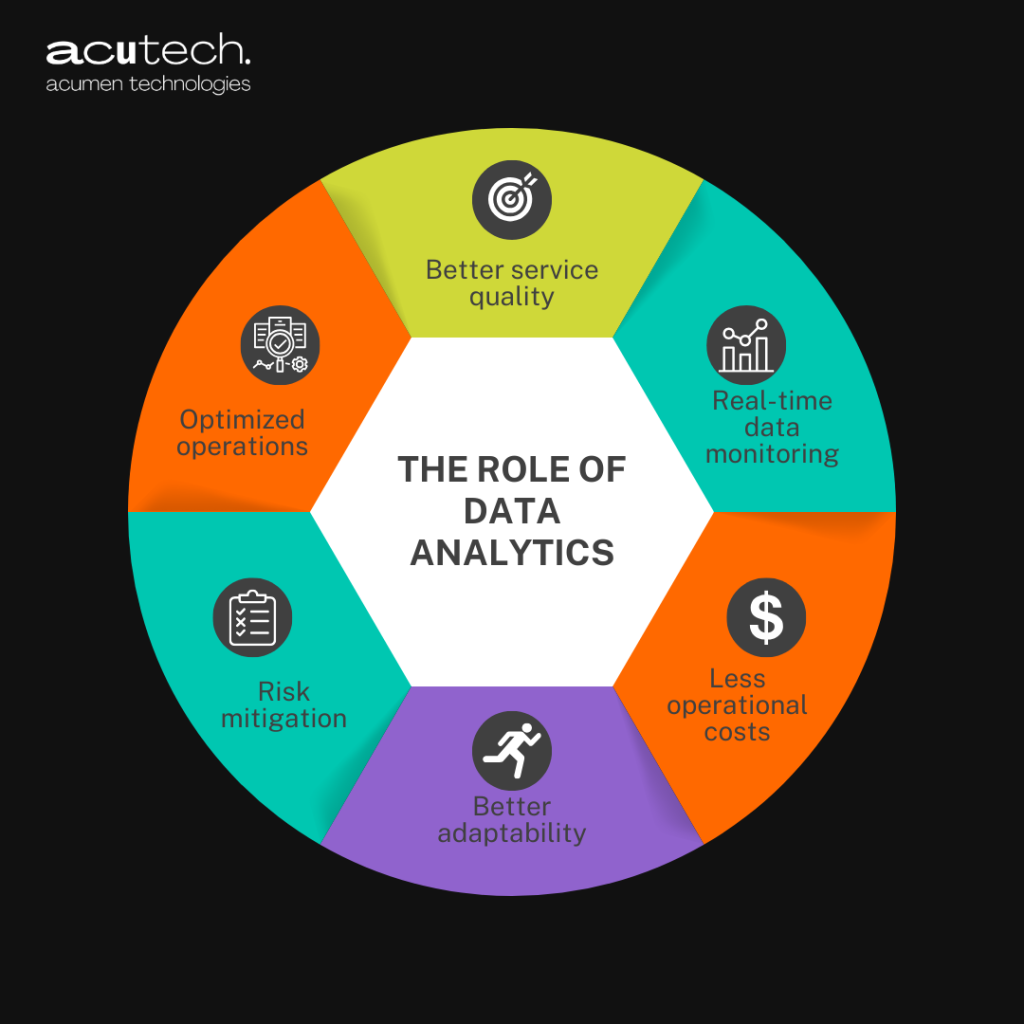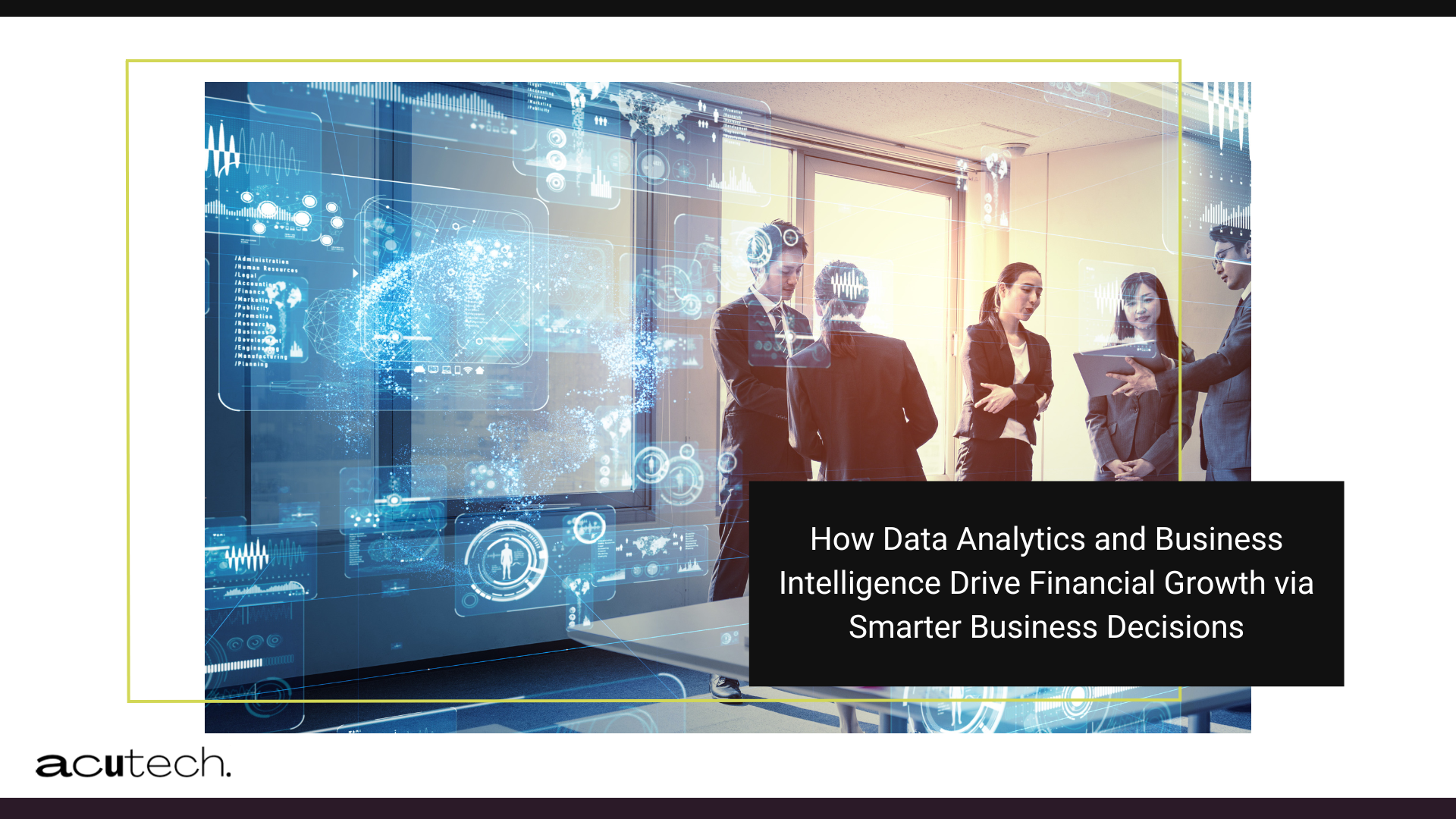Leveraging data analytics and business intelligence (BI) is crucial for making informed financial decisions. These technologies enable organizations to unlock the hidden potential of data, facilitating smarter decision-making and driving competitive advantage.
Let’s look into the transformative power of data analytics and BI, exploring their applications, benefits, and future trends below!
What is Data Analytics and Business Intelligence?
Data Analytics involves obtaining, scrubbing, exploring, modeling, and interpreting data to discover meaningful trends, patterns, and insights. This process begins with data collection, where raw data is gathered from various sources such as databases, spreadsheets, and real-time streams. Once collected, the data undergoes a scrubbing or cleaning process to remove any inconsistencies, errors, or duplicates, ensuring the dataset is accurate and reliable.
Exploration and modeling follow, where data scientists use statistical and computational techniques to analyze the data. They employ algorithms and machine learning models to identify patterns, correlations, and trends that might not be immediately apparent. This deep dive into the data can reveal critical insights about customer behavior, market trends, and operational efficiencies.
These insights help organizations make informed decisions that provide a competitive edge. For instance, a retail company might use data analytics to understand purchasing patterns and optimize inventory management, reducing stockouts and overstock situations. Similarly, a manufacturing firm might analyze production data to identify bottlenecks and improve operational efficiency.
Business Intelligence (BI) refers to the tools and approaches used in this discovery process to determine KPIs that facilitate actionable business decisions. BI tools include dashboards, data visualization software, and reporting tools that present data in an easy-to-understand format. These tools enable decision-makers to monitor business performance in real-time, track progress against strategic goals, and identify areas for improvement.
BI approaches often involve setting up data warehouses where cleaned data is stored and can be easily accessed for analysis. Advanced BI tools integrate with various data sources, providing a comprehensive view of the organization’s data landscape. This integration ensures that all relevant data points are considered when making strategic decisions, leading to more accurate and effective outcomes
The Role of Data Analytics in Business Decision-Making

One primary way data analytics influences business decision-making is through its ability to unlock the hidden potential of data. In this age of big data, organizations generate vast amounts of information, encompassing customer behavior, market trends, and operational metrics.
Data analytics empowers decision-makers to sift through this data deluge, distilling it into meaningful patterns, trends, and actionable insights. This facilitates strategic decision-making by providing a clear understanding of market dynamics and customer preferences. Additionally, data analytics enables businesses to optimize their operations through predictive analytics and machine learning. For instance, in the retail sector, data analytics can help in inventory management by predicting high-demand products, minimizing stockouts, and reducing excess inventory costs.
Moreover, data-driven decision-making fosters agility and adaptability in organizations. In rapidly changing markets, being able to respond swiftly to shifts in customer behavior or competitive dynamics is paramount. Data analytics equips organizations with the ability to monitor real-time data, detect emerging trends, and adapt their strategies promptly. This agility enhances decision-making and strengthens a company’s competitive position by allowing it to seize opportunities and mitigate risks effectively.
Real-World Applications and Benefits of Data Analytics and Business Intelligence
Successful companies across various industries harness the power of data analytics and BI to gain a competitive edge. By leveraging data-driven insights, these firms achieve remarkable results. Below are some applications in the healthcare and retail sectors:
Retail Sector
In the retail sector, data analytics and BI optimize inventory management. By analyzing sales data and consumer behavior, companies can forecast demand accurately, reduce carrying costs, and ensure product availability.
Big data analytics monitor emerging hot goods, predict sales, optimize product placements, and offer targeted marketing strategies. This leads to maximizing operational efficiency while meeting consumer expectations.
Healthcare Industry
In the healthcare industry, BI improves service quality, competitiveness, patient safety, and satisfaction. It enables doctors to identify uncovered patterns in data, recognize patients at risk, reduce errors, enhance supply chain performance, manage risks, and accelerate tasks. This not only improves patient care but also reduces operational costs.
Healthcare organizations deliver better outcomes and maintain a competitive edge in a cost-sensitive industry, by tailoring treatment plans to individual patient needs and optimizing resource allocation.
Data Analytics and Business Intelligence Implementation Challenges
Implementing data analytics and BI can be transformative, but it comes with challenges:
Data Complexity and Quality
The complexity and quality of data are perennial challenges in data analytics. Raw data can be messy, inconsistent, and riddled with outliers. It can come from various sources in different formats, making it difficult to process and analyze. Advanced data cleansing and preprocessing techniques, such as data normalization, deduplication, and anomaly detection, coupled with powerful algorithms, can transform raw data into valuable insights.
These processes ensure that the data used for analysis is accurate, reliable, and ready for use. Despite the initial challenges posed by data quality, the benefits of accurate predictions and informed decision-making provided by data analytics are substantial. Clean data leads to better insights, enabling organizations to make strategic decisions confidently.
Data Security and Privacy Concerns
Data security and privacy are paramount concerns in data analytics and BI. Organizations collect and analyze vast amounts of sensitive data, increasing the risk of data breaches and privacy violations. Robust encryption technologies, access controls, and compliance with data protection regulations, such as GDPR and HIPAA, can fortify data security. Implementing these security measures ensures that data is protected from unauthorized access and breaches.
Additionally, privacy-preserving techniques like differential privacy ensure valuable insights can be extracted without compromising individual privacy. Differential privacy adds a layer of protection by injecting statistical noise into the data, making it difficult to identify individual entries while still providing accurate aggregate insights.
The advantages of data analytics and BI in informed decision-making and improved operational efficiency far outweigh the risks when approached with due diligence and ethical practices. Ethical considerations and strict adherence to data protection standards are essential to maintain trust and integrity in data-driven operations.
The Now and Future of Data Analytics and Business Intelligence
The future of data analytics and BI lies in the rapid advancement of technologies. AI and Machine Learning (ML), and automation now play pivotal roles in data analysis, allowing organizations to process and interpret vast amounts of data at unprecedented speeds. This enables faster decision-making, real-time analytics, and more accurate predictions.
As more industries rely on data analytics, ethical considerations become more important. Organizations must ensure data privacy, transparency, and compliance with regulations. The future of data analytics will involve balancing data-driven decision-making with ethical considerations to maintain trust and credibility. User-friendly interfaces, self-service analytics, and intuitive dashboards will empower employees to harness the power of data without relying on data experts. This democratization of data will enable organizations to foster a data-driven culture and unlock the potential of every individual.
Conclusion
The advancement of technologies is poised to change how organizations analyze and utilize data. Despite the challenges, the strategic adoption of business intelligence and data analytics is not only a choice but a necessity for organizations seeking relevance and resilience in today’s data-driven world. Embracing the power of data analytics is the key to thriving in an era where data reigns supreme, charting the course for businesses to adapt and flourish in an ever-changing landscape.
With expert know-how, we can help organizations harness the power of data to optimize operations, enhance efficiency, and stay competitive. Whether you’re looking to implement predictive analytics, improve data security, or develop user-friendly dashboards, our team is ready to guide you through every step of the process.


